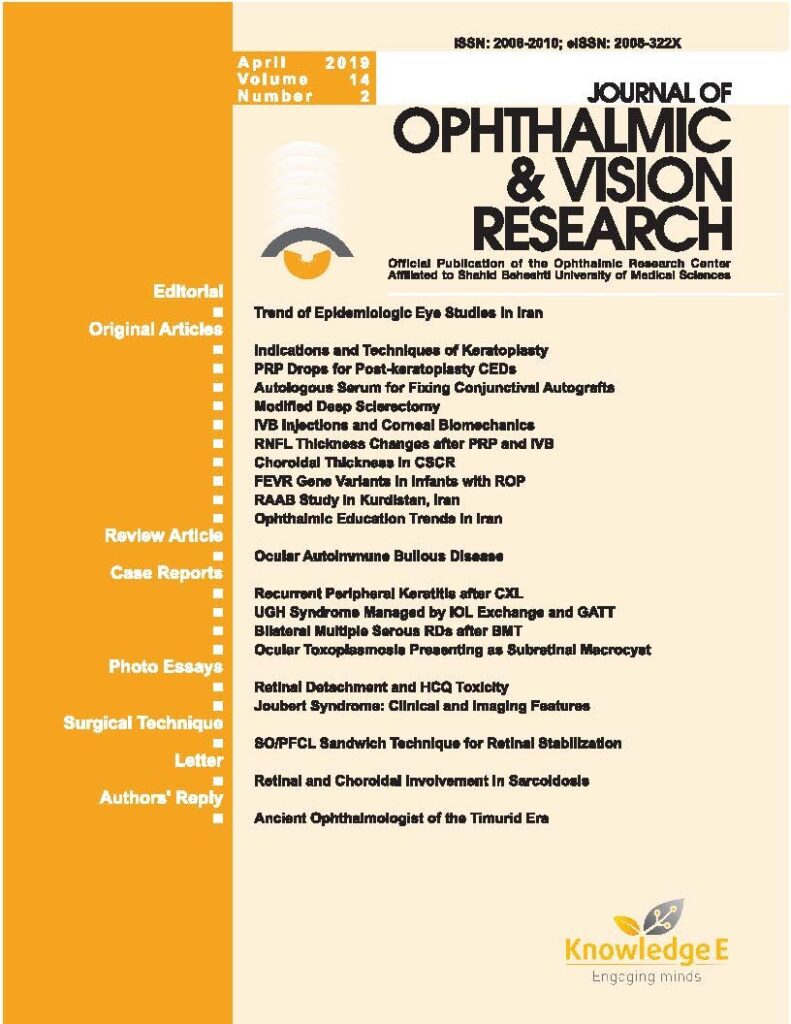
Journal of Ophthalmic and Vision Research
ISSN: 2008-322X
The latest research in clinical ophthalmology and the science of vision.
Treatment of Noninfectious Retinal Vasculitis Using Subcutaneous Repository Corticotropin Injection
Published date: Apr 29 2021
Journal Title: Journal of Ophthalmic and Vision Research
Issue title: April–June 2021, Volume 16, Issue 2
Pages: 219 – 233
Authors:
Abstract:
Purpose: To show whether subcutaneous repository corticotropin injection (RCI, Acthar® Gel, a repository corticotropin injection, can be an effective potential therapeutic agent for noninfectious retinal vasculitis.
Methods: Patients with active retinal vasculitis were followed with serial ultra-widefield fluorescein angiograms and treated with 80 units of subcutaneous repository corticotropin injection twice weekly.
Results: Primary outcome of ≥50% improvement in response level (RL) for retinal vasculitis and percent improvement in retinal vasculitis severity scoring (RVSS) by more than one quartile (≥25%) at week 12 was met in 15 and 16 of the 30 total eyes, respectively, including 1 eye with severe retinal vasculitis in each group. Complete resolution of retinal vasculitis was seen in seven eyes with a mean time of 17.1 weeks. Intraocular pressure elevation requiring therapy and cataract progression were noted in two and three eyes, respectively. One patient stopped medication due to side effects (injection site reaction).
Conclusion: Repository corticotropin injection was well-tolerated overall. Repository corticotropin injection may be an effective therapeutic agent in the treatment of noninfectious retinal vasculitis.
Keywords: Acthar, Corticotropin Gel, Fluorescein Angiography, Ocular Inflammation, Retinal Vasculitis, Uveitis
References:
1. Androudi S, Dastiridou A, Symeonidis C, Kump L, Praidou A, Brazitikos P, et al. Retinal vasculitis in rheumatic diseases: an unseen burden. Clin Rheumatol 2013;32:7–13.
2. Talat L, Lightman S, Tomkins-Netzer O. Ischemic retinal vasculitis and its management. J Ophthalmol 2014;2014:197675.
3. Ali A, Ku JH, Suhler EB, Choi D, Rosenbaum JT. The course of retinal vasculitis. Br J Ophthalmol 2014:98:785–789.
4. Manivannan A, Plskova J, Farrow A, Mckay S, Sharp PF, Forrester JV. Ultra-wide field fluorescein angiography of the ocular fundus. Am J Ophthalmol 2005;140:525–527.
5. Leder HA, Campbell JP, Sepah YJ, Gan T, Dunn JP, Hatef E, et al. Ultra-wide-field retinal imaging in the management of non-infectious retinal vasculitis. J Ophthalmic Inflamm Infect. 2013 Feb 11; 3: 30.
6. Hatemi G, Silman A, Bang D, et al. EULAR recommendations for the management of Behcet disease. Ann Rheum Dis 2008;67:1656–1662.
7. Fabiani C, Sota J, Rigante D, Vitale A, Emmi G, Lopalco G, et al. Efficacy of adalimumab and infliximab in recalcitrant retinal vasculitis inadequately responsive to other immunomodulatory therapies. Clin Rheumatol 2018;37:2805–2809.
8. Sharma PK, Markov GT, Bajwa A, Foster CS. Longterm efficacy of systemic infliximab in recalcitrant retinal vasculitis. Retina 2015;35:2641–2646.
9. Clemson CM, Yost J, Taylor AW. The role of alpha-MSH as a modulator of ocular immunobiology exemplifies mechanistic differences between melanocrtins and steroids. Ocul Immunol Inflamm 2017;25:179–189.
10. Montero-Melendez T. ACTH: the forgotten therapy. Semin Immunol 2015;27:216–226. 11. Taylor AW, Kitaichi N, Biros D. Melanocortin 5 receptor and ocular immunity. Cell Mol Biol 2006;52:53–59.
12. Lee DJ, Biros DJ, Taylor AW. Injection of an alphamelanocyte stimulating hormone expression plasmid is effective in suppressing experimental autoimmune uveitis. Int Immunopharmacol 2009;9:1079–1086.
13. Taylor AW, Streilein JW, Cousins SW. Identification of alpha-melanocyte stimulating hormone as a potential immunosuppressive factor in aqueous humor. Curr Eye Res 1992;11:1199–1206.
14. Taylor A, Namba K. In vitro induction of CD25+ CD4+ regulatory T cells by the neuropeptide alpha-melanocyte stimulating hormone (alpha-MSH). Immunol Cell Biol 2001;79:358–367.
15. 1Taylor AW, Lee DJ. The alpha-melanocyte stimulating hormone induces conversion of effector T cells into treg cells. J Transplant 2011;2011:246856.
16. Lindqvist N, Napankangas U, Lindblom J, et al. Proopiomelanocortin and melanocortin receptors in the adult rat retino-tectal system and their regulation after optic nerve transection. Eur J Pharmacol 2003;482:85–94.
17. Jabs DA, Nussenblatt RB, Rosenbaum JT. Standardization of Uveitis Nomenclature (SUN) Working Group. Standardization of uveitis nomenclature for reporting clinical data. Results of the First International Workshop. Am J Ophthalmol 2005;140:509–516.
18. Aggarwal R, Marder G, Koontz DC, Nandkumar P, Qi Z, Oddis CV. Efficacy and safety of adrenocorticotropin hormone gel in refractory dermatomyositis and polymyositis. Annals Rheum Dis 2018;77:720–727.
19. Vallet H, Riviere S, Sanna A, Deroux A, Moulis G, Addimanda O, et al. Efficacy of anti-TNF alpha in severe and/or refractory Behcet’s disease: multicenter study of 124 patients. J Autoimmun 2015;62:67–64.
20. Sharma PK, Markov GT, Bajwa A, Foster CS. Longterm efficacy of systemic infliximab in recalcitrant retinal vasculitis. Retina 2015;35:2641–2646.
21. Hickman RA, Denniston AK, Yee CS, Toescu V, Murray PI, Gordon C, et al. Bilateral retinal vasculitis in a patient with systemic lupus erythematosus and its remission with rituximab therapy. Lupus 2010;19:327–329.
22. Agarwal A, Hassan M, Sepah YJ, Do DV, Nguyen QD. Subcutaneous repository corticotropin gel for noninfectious panuveitis: reappraisal of an old pharmacologic agent. Am J Ophthalmol Case Rep 2016;4:78–82.
23. Sharon Y, Chu DS. Adrenocorticotropin hormone gel for patients with non-infectious uveitis. Am J Ophthalmol Case Rep 2019;15:100502.